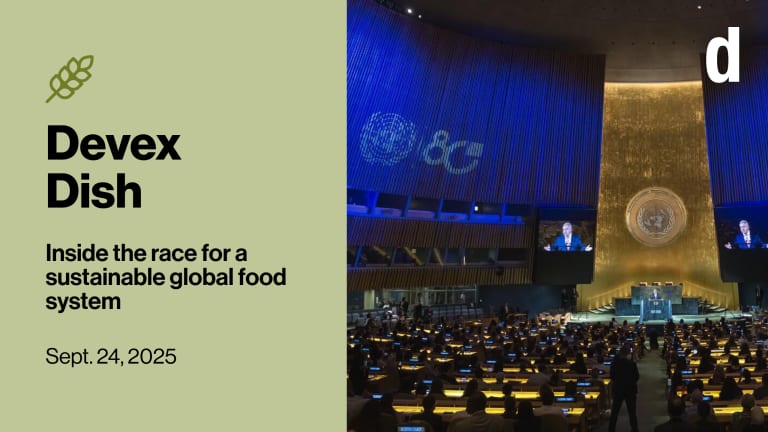
NEW YORK — Too much of the data available to track the world’s progress toward achieving the Sustainable Development Goals is outdated, said Claire Melamed, executive director of the Global Partnership for Sustainable Development Data.
“Some of this data we're using to monitor progress on SDGs were collected before the SDGs were even agreed on, and in a world of satellites and mobile phones it’s insane we’re in that position,” Melamed said in an interview ahead of her talk at an event called We the Future at Global Goals Week in New York.
While it may not be possible to know what is happening in real time, people should be able to get a sense of progress on the SDGs week after week, or at least month after month, she said.
More on UNGA 2018:
► As UNGA kicks off, Guterres calls for urgency
► In Trump's US aid review, can development principles prevail?
► International Finance Facility for Education musters growing support
“It’s about working with governments to see which of the indicators they’ve prioritized they would like more up-to-date data on and then starting to put together the partnerships that will help to deliver that,” she said.
Timeliness is just one half of the problem; the other is comprehensiveness, Melamed said.
Figures such as the estimated 263 million children out of school point to another major problem around data for the SDGs, which is that granular data about individuals is often nonexistent.
“We don’t get that number from actually counting children,” Melamed said. “We get that from counting a few children and estimating up from that to what we think the global figure is.”
One consequence of that system is that it fails to capture any additional information about the actual people the SDGs are meant to serve — in other words, the stories behind the data. People most in need are also the most likely to be absent from these headline figures.
“We know very little, not as much as we need to, about the actual children who are out of school. We don’t know how many of them are out of school because they’re looking after a sibling or they’ve been a victim of child marriage,” Melamed said.
Melamed was part of a major announcement this week on Data to End Hunger, the largest ever financial commitment on data for development, a partnership supported by donors from the United States, Germany, and Australia, the Bill & Melinda Gates Foundation, the World Bank, and other partners, to produce data for agricultural development.
“Agriculture is key to achieving so many of the SDGs,” she said. “If we want to reduce poverty, if we want to reduce hunger, if we want to increase the number of jobs, all of those things depend on agriculture in the world’s poorest countries.”
The partnership comes in the wake of a report on food security and nutrition demonstrating how levels of hunger have risen for three consecutive years.
The Global Partnership for Sustainable Development Data consistently hears from governments that one of the things they need to solve this problem is better data, Melamed said. This new initiative seeks to use the power of data to boost the productivity of 500 million smallholder farmers across 50 countries by 2030, by working with existing government systems rather than launching a new database.
New technologies “make things faster and cheaper and give us the 3D picture of societies we’ve never been able to have before,” Melamed said.
Technologies work best when they are built on solid systems: A good census bureau, a civil registration system, a consistent household survey program, and the other basic building blocks of data all governments need.
Melamed pointed to this partnership as an example of growing awareness among donors that investment in basic data systems can reap rewards in many different ways.
“The challenge for all of us is, while we’re interested in having the right numbers now, we actually all know in the long run what we need is not the right numbers now, today … but the right systems to make sure we get the right numbers today and tomorrow and next week,” she said.
NCDs. Climate change. Financing. Read more of Devex's coverage from the 73rd U.N. General Assembly here.








